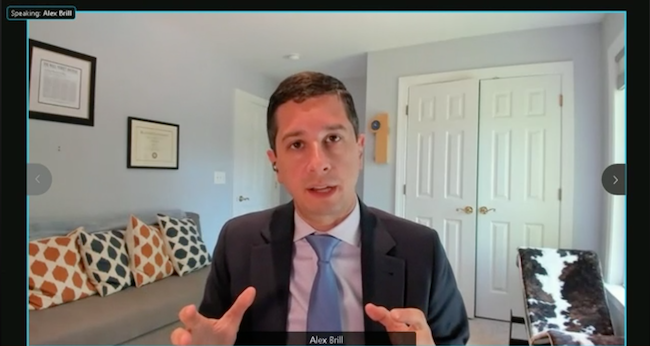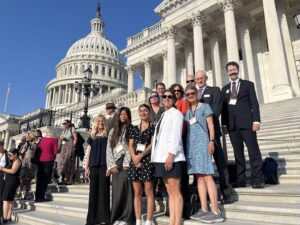
AEI’s Alex Brill discusses the benefits of carbon pricing in a hearing of the Senate Finance Committee on April 27, 2021.
CCL submits testimony to Senate Finance Committee about benefits of carbon pricing
By Sara Wanous
On April 27, 2021 the Senate Finance Committee held a hearing on “Climate Challenges: The Tax Code’s Role in Creating American Jobs, Achieving Energy Independence, and Providing Consumers with Affordable, Clean Energy.” Alex Brill, a research fellow from the American Enterprise Institute, testified in the hearing about the benefits of carbon pricing.
Here are a few highlights from his remarks:
Why do we want a #PriceOnCarbon? @AlexBrill_DC from the American Enterprise Institute (@AEI) recently answered that question in testimony before Congress. pic.twitter.com/DhPMlIait9
— Citizens' Climate Lobby (@citizensclimate) June 14, 2021
Alex’s testimony prompted many questions from senators on the committee. In response to the senators’ interest, Citizens’ Climate Lobby submitted testimony for the record, expanding on the benefits of carbon pricing. CCL’s testimony included the following key points:
Carbon pricing creates more, quality U.S. jobs
The transition to clean energy creates more jobs than generating energy through fossil fuels would. These clean energy jobs, on average, pay more than the fossil fuel alternatives and more often have benefits. Even further, a policy that distributes carbon dividends creates jobs throughout the economy, not just in clean energy.
Carbon pricing can help the U.S. move toward energy independence
A carbon price like the Energy Innovation and Carbon Dividend Act would have virtually no effect on U.S. oil production and relatively small impact on U.S. natural gas production by 2030 while effectively reducing emissions. This is possible because as U.S. fuel demand decreases as a result of the carbon price, the U.S. sources higher percentages of fuel locally and decreases imports.
Carbon pricing will provide consumers with affordable, clean energy
Reasonable carbon prices can put us quickly on the path to net-zero energy. Revenues generated from the carbon price can help keep energy affordable by applying them to programs such as equal carbon dividends to all Americans.
The U.S. is being left behind in the global movement toward carbon pricing
The U.S. is currently falling behind as one of only two developed economies without a national carbon price (Australia is the other). The EU’s announcement that it will enact a carbon border adjustment mechanism has inspired Russia and China to increase their ambition on climate action. The U.S. has the opportunity to enact a carbon price to not only avoid paying our trading partners border carbon adjustment fees, but to enact a carbon border fee adjustment that will leverage our trade relationships to encourage other countries to meet the ambition of our carbon price. Goods made in the U.S. are already 80% more carbon-efficient than the world average, meaning the U.S. holds a competitive advantage in a global market with an ambitious carbon price.
CCL’s testimony also discussed how carbon pricing is preferred by businesses, can quickly and efficiently reduce greenhouse gas emissions, will increase GDP on a net basis, dramatically improve health and save lives, and achieve emissions reductions without adding to the federal deficit. You can read the full testimony CCL submitted here.
Sara Wanous is a former research assistant on CCL’s legislative team. She is now a Legislative Assistant at Ocean Conservancy.





